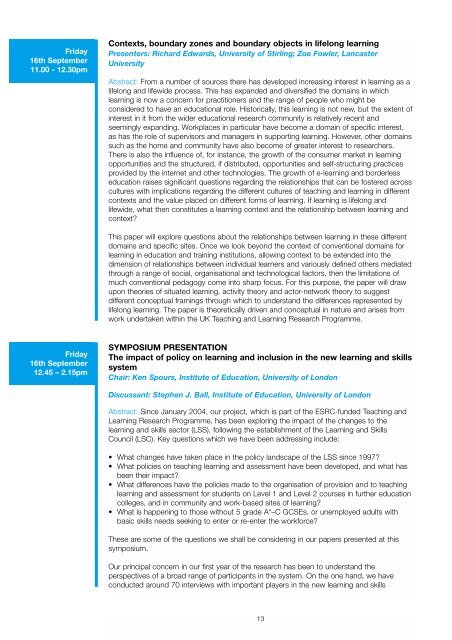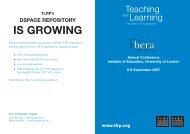Bera Booklet 2005 - Teaching and Learning Research Programme
Bera Booklet 2005 - Teaching and Learning Research Programme
Bera Booklet 2005 - Teaching and Learning Research Programme
- No tags were found...
You also want an ePaper? Increase the reach of your titles
YUMPU automatically turns print PDFs into web optimized ePapers that Google loves.
Friday16th September11.00 - 12.30pmContexts, boundary zones <strong>and</strong> boundary objects in lifelong learningPresenters: Richard Edwards, University of Stirling; Zoe Fowler, LancasterUniversityAbstract: From a number of sources there has developed increasing interest in learning as alifelong <strong>and</strong> lifewide process. This has exp<strong>and</strong>ed <strong>and</strong> diversified the domains in whichlearning is now a concern for practitioners <strong>and</strong> the range of people who might beconsidered to have an educational role. Historically, this learning is not new, but the extent ofinterest in it from the wider educational research community is relatively recent <strong>and</strong>seemingly exp<strong>and</strong>ing. Workplaces in particular have become a domain of specific interest,as has the role of supervisors <strong>and</strong> managers in supporting learning. However, other domainssuch as the home <strong>and</strong> community have also become of greater interest to researchers.There is also the influence of, for instance, the growth of the consumer market in learningopportunities <strong>and</strong> the structured, if distributed, opportunities <strong>and</strong> self-structuring practicesprovided by the internet <strong>and</strong> other technologies. The growth of e-learning <strong>and</strong> borderlesseducation raises significant questions regarding the relationships that can be fostered acrosscultures with implications regarding the different cultures of teaching <strong>and</strong> learning in differentcontexts <strong>and</strong> the value placed on different forms of learning. If learning is lifelong <strong>and</strong>lifewide, what then constitutes a learning context <strong>and</strong> the relationship between learning <strong>and</strong>context?This paper will explore questions about the relationships between learning in these differentdomains <strong>and</strong> specific sites. Once we look beyond the context of conventional domains forlearning in education <strong>and</strong> training institutions, allowing context to be extended into thedimension of relationships between individual learners <strong>and</strong> variously defined others mediatedthrough a range of social, organisational <strong>and</strong> technological factors, then the limitations ofmuch conventional pedagogy come into sharp focus. For this purpose, the paper will drawupon theories of situated learning, activity theory <strong>and</strong> actor-network theory to suggestdifferent conceptual framings through which to underst<strong>and</strong> the differences represented bylifelong learning. The paper is theoretically driven <strong>and</strong> conceptual in nature <strong>and</strong> arises fromwork undertaken within the UK <strong>Teaching</strong> <strong>and</strong> <strong>Learning</strong> <strong>Research</strong> <strong>Programme</strong>.Friday16th September12.45 – 2.15pmSYMPOSIUM PRESENTATIONThe impact of policy on learning <strong>and</strong> inclusion in the new learning <strong>and</strong> skillssystemChair: Ken Spours, Institute of Education, University of LondonDiscussant: Stephen J. Ball, Institute of Education, University of LondonAbstract: Since January 2004, our project, which is part of the ESRC-funded <strong>Teaching</strong> <strong>and</strong><strong>Learning</strong> <strong>Research</strong> <strong>Programme</strong>, has been exploring the impact of the changes to thelearning <strong>and</strong> skills sector (LSS), following the establishment of the <strong>Learning</strong> <strong>and</strong> SkillsCouncil (LSC). Key questions which we have been addressing include:• What changes have taken place in the policy l<strong>and</strong>scape of the LSS since 1997?• What policies on teaching learning <strong>and</strong> assessment have been developed, <strong>and</strong> what hasbeen their impact?• What differences have the policies made to the organisation of provision <strong>and</strong> to teachinglearning <strong>and</strong> assessment for students on Level 1 <strong>and</strong> Level 2 courses in further educationcolleges, <strong>and</strong> in community <strong>and</strong> work-based sites of learning?• What is happening to those without 5 grade A*–C GCSEs, or unemployed adults withbasic skills needs seeking to enter or re-enter the workforce?These are some of the questions we shall be considering in our papers presented at thissymposium.Our principal concern in our first year of the research has been to underst<strong>and</strong> theperspectives of a broad range of participants in the system. On the one h<strong>and</strong>, we haveconducted around 70 interviews with important players in the new learning <strong>and</strong> skills13
















